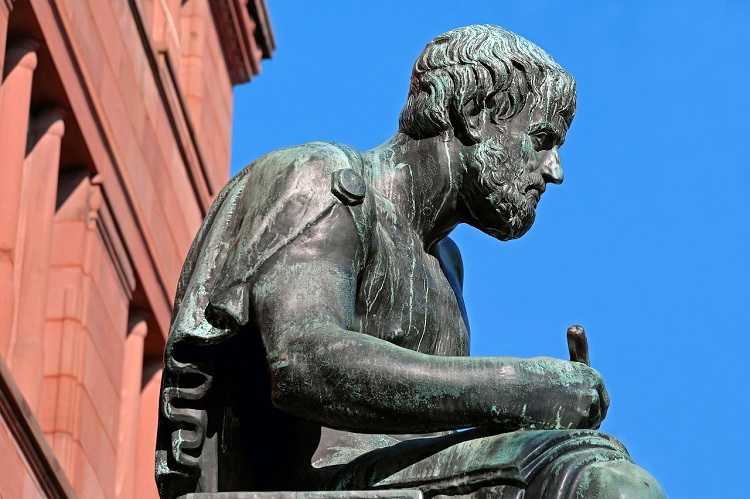Classical Philosophy for a Modern Lifestyle
JULY 16, 2022

The modern world owes a great deal to the wisdom and vision of the philosophers of ancient Greece. The likes of Socrates, Plato and Aristotle – along with their forebears and successors – are renowned as being among the greatest thinkers the human race has ever known and, as you will see below, many of their ideas are fundamental to our modern way of life.
The Four Elements (Empedocles)

The idea of the four classical elements – earth, water, air and fire – constituting all of the planet’s matter was first formalised by Empedocles, a pre-Socratic philosopher who, legend has it, died after throwing himself into the Mount Etna volcano. Whilst the classical elements are no longer formally recognised within the scientific community, their existence has helped to explain the basic concept of matter to generations.
Mathematics (Pythagoras)

Many of us will remember learning about Pythagoras’ theorem, which is regarded as one of the founding principles in the mathematic field of geometry. Many other ideas and discoveries have also been attributed to Pythagoras over the centuries, ranging from the musical to the astronomical. Scholarly debate now rages over the extent to which the man himself formulated these original ideas, but his story is another example of the powerful influence the ancient Greeks had on many aspects of modern life.
Atomic Theory (Leucippus and Democritus)

Just how incomparably far-sighted and perceptive the thinkers of ancient Greece were is demonstrated by the fact that the theory of atomism – the idea that matter consists of tiny particles called atoms – was first proposed by the philosopher Democritus and, it is alleged, his mentor, Leucippus (although many experts now believe the latter was actually a non-existent, allegorical figure).
The Golden Mean (Aristotle)

Our first example of a theory proposed by one of the ‘big three’ ancient Greek philosophers (Aristotle, Plato and Socrates), the Aristotelian ‘golden mean’ suggests that the favourable condition for most circumstances is a middle ground between its two extremes. Many cultures have adopted this approach to life; the Quran, for example, instructs followers of Islam not to spend money to the point of extravagance but, equally, not to be so parsimonious as to prevent living in comfort.
The Socratic Method (Socrates)

Before the ideas of Socrates were put into practice, formal teaching was generally administered in an instructive style, with authoritative figures delivering matter-of-fact lectures. Socrates proposed a teaching method that was somewhat more democratic, encouraging mentors to ask their students questions so that the pupils would be encouraged to arrive at their own conclusions. This method lives on today and can be seen in all kinds of educational settings, from pre-school classrooms to university seminars.
Higher Education (Plato)

Speaking of education, we must not forget the huge influence that another of our ‘big three’ philosophers, Plato, had on promoting the cause of formal learning. It is widely accepted that Plato’s Academy – founded in Athens – was the world’s first institute of higher education, paving the way for the colleges and universities that have since formed such an important part of our society.
Justice (Plato)

Even more vital were Plato’s contributions to the field of justice. Plato’s Republic – arguably the most significant philosophical work to have ever been written – sets out a judicial theory that is still adhered to today. His arguments are complex and far-ranging, but one key point he makes is that ensuring good deeds are rewarded and bad deeds punished is ultimately beneficial to both the individual and society as a whole.
Sophistry (The Sophists)

Perhaps a controversial inclusion on our list (superficially, at least), ‘sophistry’ does not exactly have a good name today. The Oxford Dictionary defines the term as ‘the use of clever but false arguments, especially with the intention of deceiving’. However, the sophists – a group of teachers in ancient Greece – should actually be thanked for educating the world on the art of persuasion. It is no accident that the first professional lawyers identified themselves as sophists.
Western Philosophy (Aristotle)

Finally, we must pay further tribute to Aristotle. A pupil of Plato and mentor to Alexander the Great, his wide-ranging writings are so comprehensive that he is now generally accepted as the true father of Western philosophy. There is no doubt that many of his ancient Greek contemporaries made important contributions to various philosophic disciplines, but his illuminating texts on topics as diverse as zoology, poetry and economics have ensured his rightful place at the zenith in the pantheon of the world’s greatest thinkers.
Image Credit
Cristina Gottardi, Andy Watkins, Nick Hillier, Hal Gatewood, Walter Walraven, Nathan Dumlao, Alexis Brown, AJEL, Rawpixel, Couleur


